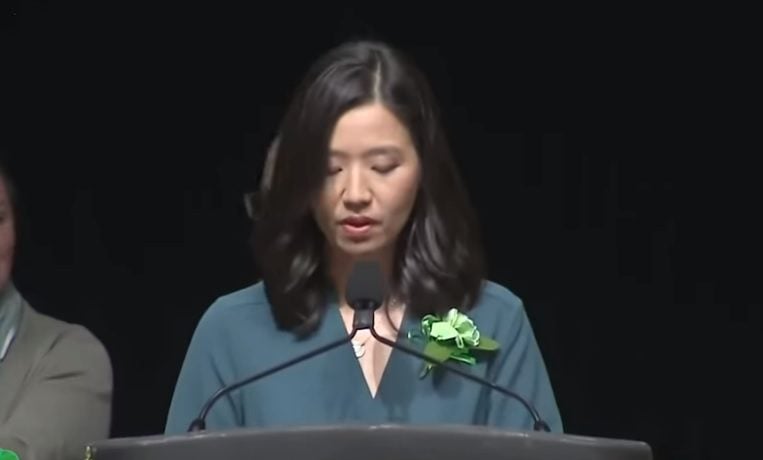
Boston’s newest Democrat mayor Michelle Wu has just announced the creation of a ‘Reparations Task Force’ which will look into the issue of reparations for black residents.
California and Rhode Island are already doing this and apparently, Michelle Wu wants to get Massachusetts into the game.
It’s nothing more than virtue signaling with tax dollars.
WGBH News reports:
Wu reveals members of the new Boston Reparations Task Force
Mayor Michelle Wu revealed Tuesday the members of Boston’s Reparations Task Force, setting the stage for the panel charged with guiding the city’s response to the historic impacts of slavery on the city’s Black American population.
“For four hundred years, the brutal practice of enslavement and recent policies like redlining, the busing crisis, and exclusion from city contracting have denied Black Americans pathways to build generational wealth, secure stable housing, and live freely,” said Wu. “Our administration remains committed to tackling long-standing racial inequities, and this task force is the next step in our commitment as a city to advance racial justice and build a Boston for everyone.”
The 10-member panel will be chaired by attorney Joseph Feaster Jr., former president of the NAACP Boston branch and a current member of the city’s Black Men and Boys Commission.
Three members of the ‘task force’ are students. Two of them are in high school:
– Chair Joseph D. Feaster Jr.
– Denilson Fan Fan, 11th grader at Jeremiah E. Burke High School
– L’Merchie Frazier, public historian, visual activist, and executive director of creative and strategic partnerships for SPOKE Arts
– George “Chip” Greenidge Jr., founder and director of Greatest MINDS
– Dr. Kerri Greenidge, assistant professor of studies in race, colonialism and diaspora at Tufts University
– Dr. David Harris, past managing director of the Charles Hamilton Houston Institute for Race and Justice
– Dorothea Jones, longtime civic organizer and member of the Roxbury Strategic Masterplan Oversight Committee
– Carrie Mays, UMass Boston student and youth leader with Teen Empowerment
– Na’tisha Mills, program manager for Embrace Boston
– Damani Williams, 11th grader at Jeremiah E. Burke High School
Does Mayor Wu know that Boston was a hotbed of opposition to slavery?
From the Massachusetts Historical Society:
Boston Becomes the Antislavery Hub
Between 1831 and 1865, as the population of Boston surged from 60,000 to more than 175,000, the African American population remained relatively stable—increasing to about 2,400. The Boston abolitionist movement first emerged from this long-settled, free Black population and freedom seekers who settled here. The interracial New England Anti-Slavery Society was founded at the African Meeting House in 1832, and during the first years of its publication, three quarters of the subscribers to The Liberator were Black.
Through the pages of The Liberator, other local antislavery publications, and lecture tours by visiting American and English abolitionists, Boston became a hub of the national and international antislavery movement. The anniversary of emancipation in the British West Indies on 1 August 1834 became one date that was commemorated in Boston in the years that followed. Antislavery societies also often held rallies or events on the Fourth of July in the 1830s and 1840s.
In addition to The Liberator, the words of abolitionists were printed on broadsides and sung as hymns in churches. While meetings took place around the city, the African Meeting House, which was built on Beacon Hill in 1806, provided a discrimination-free place for meetings and worship.
Democrats are absolutely determined to find racism wherever they can.
They want Americans to hate each other.
